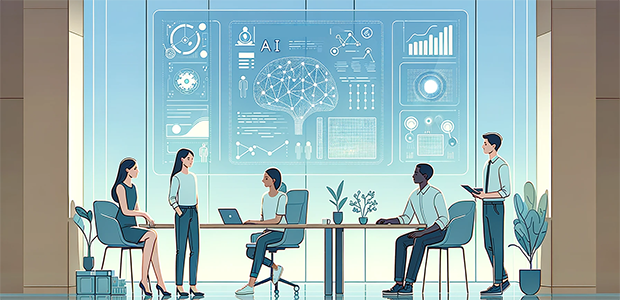
How generative AI empowers startup founders
ChatGPT made its debut in November 2022, and the impact and adoption was almost instant across the globe in the tech community. As it marks its one-year anniversary on the 30th of this month, the situation is very different.
Today, ChatGPT, along with other large language models, are being used widely and have positively impacted many individuals and businesses across various industries.
Generative AI, spearheaded by OpenAI's ChatGPT, has become a game-changer and a valuable asset for startups. It provides startup founders with a versatile tool for communication, ideation, and problem-solving. Its natural language processing capabilities allow founders to streamline problem solving, content creation and improve their daily lives in general. By leveraging this language model, startups can boost productivity, simplify decision-making processes, and ultimately drive their businesses forward in a competitive landscape.
And, the European AI ecosystem is increasingly competitive. With over 1,150 AI companies, the continent slowly starts to be able to compete with the US as an AI hub, attracting attention from investors. For instance, some of the most well-funded startups in Europe right now, according to sifted, are Paris-based Mistral with a competitor to GPT4 as an open source large language model, Stability AI with a GPT competitor, UK-based, Synthesia with AI generated video production, exemplifying the thriving landscape of innovation in Europe.
Why generative AI helps to stay ahead of competition
Every company should integrate generative AI into their tech products or processes, especially startups and SMEs. However, like any tool, ChatGPT can’t solve every startup challenge or suit every product, but it will definitely help optimise processes - saving time and resources.
For startups, where rapid learning is crucial, any tool that accelerates this learning curve becomes fundamental to success. ChatGPT, and other large language models, has become a strategic tool. Whether it's streamlining communication, generating creative ideas, identifying potential investors, or aiding decision-making, the toolbox of generative AI empowers users to stay ahead in a dynamic and competitive landscape.
A diversified and competitive market prevents AI surplus from being monopolised by one or two giants, ensuring a healthier and more inclusive ecosystem. This environment also allows emerging startups to adapt to changes, pivot, and prepare for the next phase where they will need specialists in specific areas.
The new normal – a second AI powered brain
Startups founders can now trust in having a second brain powered by AI, but startups still need to hire employees with excellent interpersonal skills to lead their teams effectively. The human-element is still key to building a well-functional and thriving business.
ChatGPT serves as a tool, much like virtual reality headsets and 3D printers. But, we still need to remember that it’s just a tool, if we forget about that and neglect customers who interact with this tool, it can lead to poor experiences and connections. The built-in advantage for a startup is better prerequisites to keep a strong customer focus – as there is a lot less complexity in a startup compared to an incumbent with existing processes. Keeping your customer focus while assessing what this technology can do and how it will impact the current way of doing things is the key objective for a startup trying to leverage generative AI.
The journey toward a thriving European AI ecosystem that can compete with the already very strong ecosystems in other parts of the world such as the US will require actively supporting companies building in this space as well as providing more regulatory clarity. By fostering healthy competition and addressing regulatory concerns, we can ensure that the benefits of AI are shared widely, empowering startups to navigate the competitive landscape and thrive in a post generative AI era.
Sam Altman's departure from and return to OpenAI, along with the governance issues, raises uncertainties about its future direction and potential implications for the broader AI startup landscape.
The Open AI struggle exemplifies the problem around where regulation should happen – requiring companies to regulate themselves around ethical AI development without success highlights the need for an industry level regulation and clarity.
The real opportunity – creating products that weren’t possible prior to generative AI
Startups have to remember that generative AI also creates enormous opportunities for incumbents that already have lots of customers. For a startup, trying to improve something that already exists with AI is likely difficult since incumbents also will progress and leverage AI. Trying to beat them to a “product X but with AI” is likely a very difficult play since you will be playing catch up on a feature-by-feature basis. With the example of a startup trying to build AI powered email, there are a lot of fundamental features and capabilities that a startup would need to build even to be on par with the existing tools on the market. By the time you have built those fundamental features, it is quite likely that the incumbent already has been able to embed generative AI into their product.
Instead, a more challenging but most likely an approach with a lot more upside is using this technology to rethink a function or process in a way which wasn’t possible before prior to the existence of generative AI. This technology opens up to a realm of new possibilities that no one has thought of before. For Zupyak, the core problem we are addressing is how to efficiently market your business without relying on external marketing agencies that often get you mixed results at sometimes a high cost.
Thanks to AI, we can replace the end-to-end marketing processes, from coming up with a plan to content creation and distribution or media buying. This will cost a fraction of the cost of using a marketing agency, while being able to compromise on quality. Thinking about problems in this way – building products that weren’t possible prior to generative AI – is the big startup opportunity for 2024 and beyond in our view.

